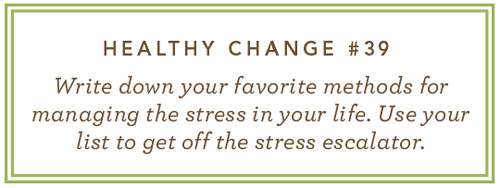The Peace Within

The quick answer: Worried sick? Better take control of your stress.
__________________________________________________________________
A Cabin in the Woods
Way back in the ‘30s, my grandfather had the brilliant idea to build a cabin in the woods. I loved its rough-sawn exterior and knotty pine interior. To get to it you left the highway, crossed over a wooden bridge, and took a narrow dirt road through the forest. The cabin had a large shady porch perfect for sitting and reading. For 75 years that cabin—shown above—was a gathering place for our family. Though our means were modest, our little cabin in the woods made us children rich as any king.
My fondest childhood memories revolve around that cabin. I remember climbing upstairs to bed, a little frightened to be alone, and going to sleep while the flame from a kerosene lamp flickered on the walls. I awoke in the morning to the sound and smell of wood crackling downstairs in the fireplace. The morning sun, shining through the trees, replaced the darkness of the night. I had survived the night to enjoy another heavenly day at the cabin.
Life can be stressful, even for kids, but at our cabin I never felt anything but peace.
Dr Dean Ornish
A current N. Y. Times article, “Dieting for Health, Not Weight” by Dr. Dean Ornish—famous for advocating prevention of heart disease through lifestyle improvement—supports the position of Word of Wisdom Living:
“In 35 years of medical research . . . we have seen that patients who ate mostly plant-based meal . . . engaged in moderate exercise and stress-management techniques . . . . [enjoyed]improved blood flow and significantly less inflammation which matters because chronic inflammation is an underlying cause of heart disease and many forms of cancer. We found that this program may also slow, stop or reverse the progression of early stage prostate cancer, as well as reverse the progression of Type 2 diabetes.”
That’s a lot but Dr. Ornish found additional health benefits for his plant-based, low-meat program, including:
- In just three months of healthful living, the expression of over 500 genes that protect against disease was activated,
- Telomerase length (indicative of gene health and longevity) improved,
- Weight loss (loss of 24 pounds in a year and 12 lbs of net weight loss maintained after five years.
Dr. Ornish’s program, as noted above is based on a whole foods diet, exercise, and management of stress. This post is about stress.
Stress
There may be shortages of some things in life, but there’s always enough stress to go around. But stress, though a bit is necessary to get us moving in the morning, is toxic in excess. Most of our Healthy Changes are about eating right, four support exercise, but just one addresses stress. So, for your own good, please take some time to ponder this Healthy Change.
We discussed stress in a post last year. We talked about Hans Selye (1907-1982) the doctor best known for linking chronic stress with disease. We discussed the role chronic stress plays in premature aging (the meanest cut), cancer, and heart disease. The list goes on.
There’s a ratchet quality to stress—after a stress episode, we often don’t return to the relaxed state. Rather there is a residue that remains so that in the next bout—and there’ll always be another episode—we’re driven to higher and higher levels of stress. When caught in these chronic stress cycles, we take it as the new “normal.” Like fish in water, we can be quite unaware of a toxic stress level. This is very common when the economy is bad, like right now.
Finding Peace
The key is not to run faster but to step out of the stress cycle. Here are seven ways from the prior post:
- Family: The supporting love of family can be a great comfort. Who hasn’t come home from work, carrying all the troubles of the day on their shoulders, and found instant relief by getting down and wrestling with the kids?
- Best friends: A study of English children found being with their best friend gave the best relief from stress. Cortisol, the stress hormone produced by the adrenal glands, was most effectively relieved for children by best friends. Who’s your best friend?
- Music: The beautiful wife just saw a bumper sticker for the classical music station: “Less stress, more Strauss.”
- Exercise: Strengthening the body helps it to relax and stimulates a similar process for the mind.
- Worship: Don’t you find, in the rhythm of church ritual, clarification of what’s really important? Whatever your faith, the God who orders the universe knows your name and proffers His peace.
- Meditation: Thinking more deeply about whatever troubles you can lead to new insights, and better paths to follow.
- Laugh: Remember Ferris Bueller? Life goes by pretty fast; if you don’t stop and have a little fun, you just might miss out

Please Comment: Too much stress for comfort? Share your best stress reduction experiences. Been worried sick? It happens. How do you get well? Stress is one ailment where you can be your own best doctor.
 Sunday, September 23, 2012 at 10:01PM | by
Sunday, September 23, 2012 at 10:01PM | by  Skip Hellewell |
Skip Hellewell |  5 Comments |
5 Comments |  1 Reference | | in
1 Reference | | in  healthy change,
healthy change,  stress |
stress |  Email Article
Email Article 

